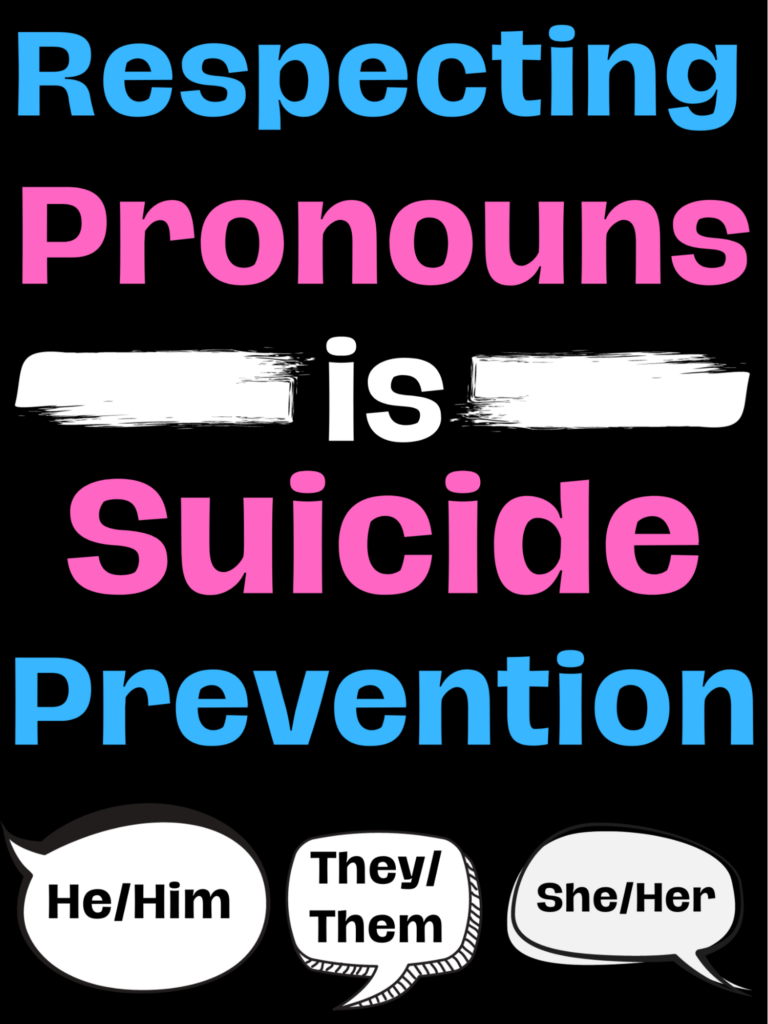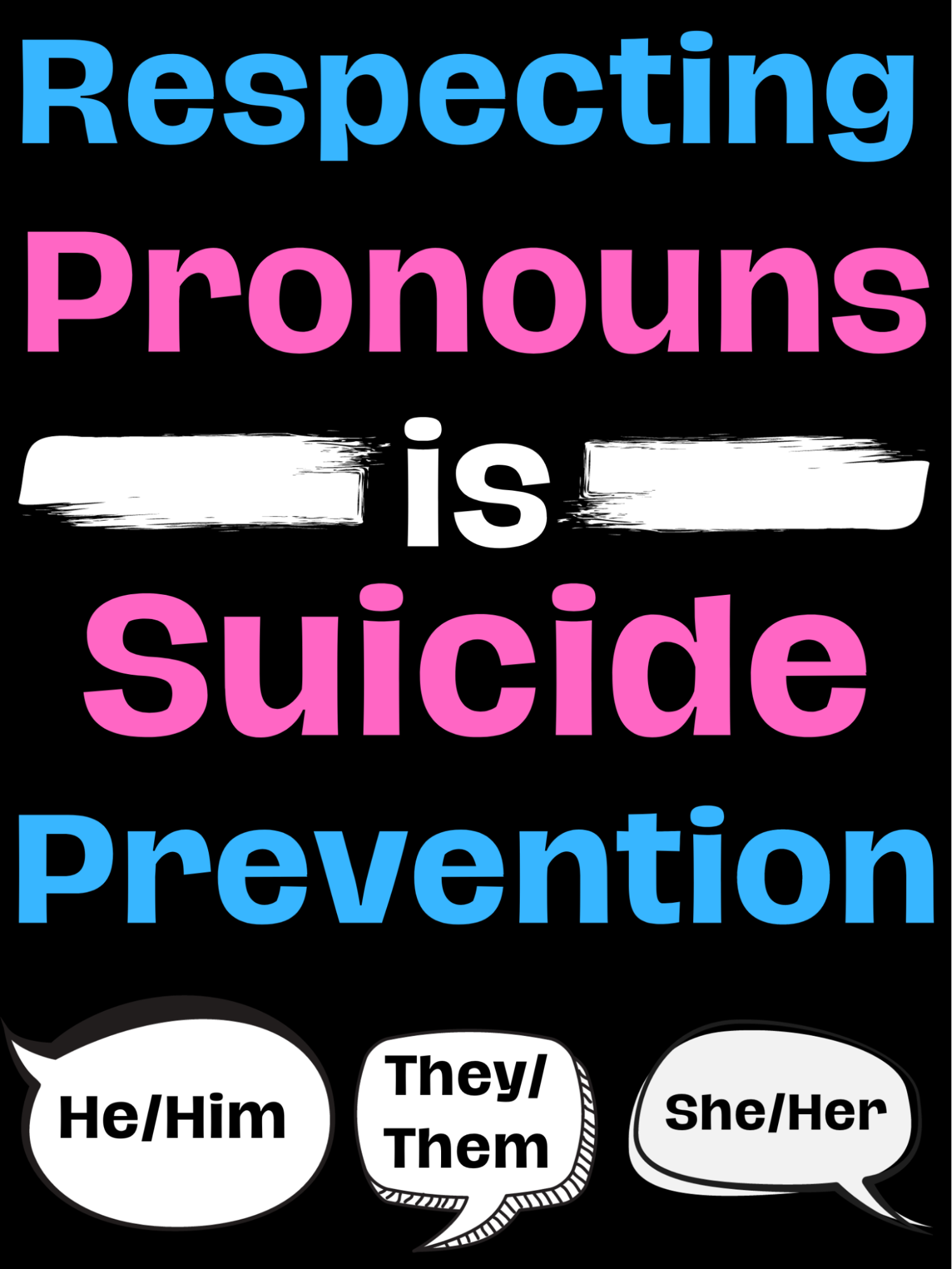Why Trans Awareness matters
November 13th-19th is Transgender Awareness Week, a week to learn about trans issues, listen to stories of trans people and to actively show support for transgender individuals. Since trans issues have become so politically charged and polarizing, spending time learning about the realities of transgender people face is more important than ever.
Why Trans Awareness Week Exists
Simply put: Because it is needed. “But why isn’t there a Cisgender Awareness Week, too?!” Because you don’t need one. No one is trying to ban you from using a public bathroom for being cisgender. No one is limiting your access to medical care because you are cisgender. No one is hosting entire political and media campaigns calling you a “danger to society” and a “sexual pervert” because you are cisgender. If you truly believe you are “oppressed” by the “trans agenda,” then I recommend you keep reading this article to actually learn about the issues you are strawmanning and misrepresenting. After all, that’s what this week is all about!
I want to make something clear: Transgender people always have and always will be a part of our society. Trans people are not going to go away just because you “don’t understand” what it means to be trans. Being trans is a very complex and nuanced experience for every individual, but what matters most is treating people with respect and dignity, even if you don’t understand what exactly they have experienced.
Trans people should not make you “uncomfortable.” If you feel that way, I want you to ask yourself: Why am I so upset with another person who chooses to express themself in a way that is different from what I deem “acceptable?” Ask yourself, genuinely, what is so wrong about someone choosing to go by a different name or pronouns than what they were given at birth?
Being Aware of Propaganda Against Trans People
In the past few years, there has been a media and political frenzy demonizing transgender and other LGBTQIA+ individuals. Talking points that antagonize trans individuals are based on flawed logic, outrageous stretches of the imagination, and utter lies. There is no factual or logical backing for these arguments; they are based solely on bigotry, idiocracy, and misinformation.
One of the main slander points against trans people can be summed up as this: “Trans people are gross sexual perverts that are preying on children!” First of all: No, that is not true and not supported by any statistics or evidence. Second of all: If this were happening so frequently, how come we never see any cases going to trial, or hear any testimony from victims?
Third of all: An offender commits offenses because they are an offender, simple as that. Being a horrible person has nothing to do with being cisgender or transgender. A cisgender person’s actions have nothing to do with them being cisgender, so why do we flip that logic when it comes to trans folks?
Another point against this argument: Do you remember the NBC show “To Catch A Predator” with Chris Hanson? Remember how they never caught a trans person or a drag queen trying to prey on children? Remember how most of the people busted in the sting operations were cisgender men who were community/religious leaders, city officials, doctors, engineers, veterans, and “wholesome” family men?
It’s almost like anyone, even people who we trust and who are in respected positions of authority, can be predators, and irresponsibly slapping that label on a group simply because you dislike them is immature and dangerous.
Then there’s the other tactics: Banning trans people from sports teams because “It’s not fair!” even though trans people competing in sports was never a problem in the past. “There’s only two genders!” This is historically, neurologically, biologically and culturally incorrect. Trans people have always existed throughout history; there are languages and cultures that have words to describe someone who falls outside of the binary man/woman. Further, gender identity is psychological, and what research has found is that the neurology of a trans person aligns with their true gender identity, not their gender assigned at birth.
Many also worry about the use of hormone blockers on trans youth. Typically, this is the very last step trans youth will take when transitioning. Trans kids will usually do the steps of changing their name and pronouns long before ever getting on puberty blockers. Often, this process takes so long that the window for taking puberty blockers passes. There are also many other obstacles that stop trans kids from starting blockers in the first place; they may not be safe to come out at home or in their community, or they may not have access to the medical care/facilities that offer the care they need. Recently, we have seen laws popping up all over the country that ban trans youth from accessing gender affirming care as well.
Trans youth that take puberty blockers are heavily monitored and examined before and while taking puberty blockers. According to Mayo Clinic, young people who are experiencing gender dysphoria will have better mental health outcomes such as easing depression and anxiety, lowering or resolving thoughts of self-harm, and potentially lower the need for future surgeries later in life as part of their transition.
If the person decides later on to discontinue use of blockers, puberty will resume as normal. As with any medication, there are some risks; with puberty blockers, most of them are related to bone density. If you believe that this is too much of a risk for a child, I posit this: I started birth control at fifteen, and I know people who started it even younger than I did. The side effects of the pill can include strokes, blood clotting, weight gain, and intense mood swings. These are risks, yes, but for me, starting birth control was the only way to regulate my PMDD and hormonal acne (which caused physical pain). Why do we consider this to be an acceptable decision for a young person like myself to make, but puberty blockers used to treat gender dysphoria in youth are frowned upon?
Gender Dysphoria is classed in the DSM-5 as a mental illness that needs treatment in order for the person to lead a better life. The only true way to cure it is by transitioning. Gender dysphoria leads to extreme feelings of discomfort, low self-esteem, depression and anxiety, poor social relationships, and suicidality. If a young person is experiencing dysphoria, we should be taking steps to improve their wellbeing by allowing them to transition.
Respecting Pronouns & Showing Compassion for Others

Remember the Golden Rule we all learned in kindergarten: Treat others the way you want to be treated. That rule still applies in adulthood. Having respect for people should not be conditional on whether or not you understand their identity.
When we talk about respecting pronouns and chosen names, it is not only about respect; it is about lowering rates of suicide, depression, and anxiety in our communities. It is about improving our workplace environments so trans people can continue to participate in the workforce and make a living. It’s about raising our high school graduation rates, because trans youth are statistically more likely to drop out of high school. It’s about lowering our rates of bullying in schools, because trans youth are shown to experience more bullying than their cisgender peers, simply due to their identity. Respecting pronouns and chosen names is not “the woke agenda,” it is an act of mental health awareness, respect, and kindness.
In studies done by Mayo Clinic, the American Academy of Pediatrics, and the World Health Organization, it is shown that respecting chosen names and the identity of trans people/trans youth leads to better mental health outcomes. This point specifically is what is so egregious about choosing to disrespect a person’s identity; deciding to be “edgy” and “anti-woke” by blatantly ignoring every study done on trans mental health is one of the most pathetic actions I can think of. You’re not “counter culture,” you’re an asshole. Learn to have compassion, it’ll make you feel a lot better than being bitter and angry about a minority group.
The Importance of Transitioning & Access to Gender-Affirming Care
Micah Evans (They/Them/Theirs) is a Campus Wellbeing Educator here at NDSU. They have personally experienced gender affirming care, as well as the struggles of coming out. Below is their statement about their experience.
Micah’s Statement: “Being able to socially and physically transition improved my quality of life tenfold. I’m from a very small conservative town and knew that publicly transitioning while still living there would not be safe for me. Now that I am able to live in a relatively supportive and accepting place like Fargo, and having met my friends who are my biggest supporters and cheerleaders, I finally feel safe in my trans identity. Before I transitioned, I never felt at home in my body; who I saw in the mirror was not the person I was inside. I didn’t feel connected to my given name, and did not associate myself with any of the expected traits of my assigned gender at birth (AGAB). Being able to start hormone therapy and use my preferred name and pronouns after graduating and moving here was an extremely liberating experience and one I still get bursts of joy from. It is my genuine dying wish to see every trans kid get to live their lives full of the peace I feel now. My feeling of safety and security in my own body is a direct result of being provided access to gender affirming care, and the fact that I was able to safely transition in a space where I was being supported.”
The rate of people who transition actually regretting the process is around 1%. Of people that do detransition, many do so because of the financial burden of fully transitioning, while others choose to stop transitioning because of a lack of acceptance from those around them. HRT and puberty blockers are shown to be safe and effective forms of gender affirming care for trans people, and they have the right to access them. Transitioning is highly important, and all trans people should have the right to live their lives as their authentic selves.
How to Participate in Trans Awareness Week
There are many ways to participate in this week! First of all, the Campus Wellbeing Educators will be tabling in the Memorial Union and handing out some fun trans awareness stickers and buttons. You can also visit the LGBTQIA+ Resource Room in MU for access to even more resources and trinkets.
You can also show support by adding your own pronouns to your email signature, social media bio, or adding a pin to your backpack! Yes, pronouns matter even if you are cisgender, because it helps to show support for people who have/are transitioning!
The past few years of unrelenting media attacks and legislation has made life harder for trans and gender nonconforming folks than it ought to be. It is important now more than ever to show our unrelenting support and love for transgender people. Listen to trans stories and experiences, and find out what you can do to support and uplift trans people in your community.
